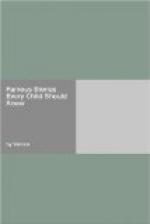August did not heed his father’s silence: he was used to it. Karl Strehla was a man of few words, and, being of weakly health, was usually too tired at the end of the day to do more than drink his beer and sleep. August lay on the wolfskin dreamy and comfortable, looking up through his drooping eyelids at the golden coronets on the crest of the great stove, and wondering for the millionth time whom it had been made for, and what grand places and scenes it had known.
Dorothea came down from putting the little ones in their beds; the cuckoo-clock in the corner struck eight; she looked to her father and the untouched pipe, then sat down to her spinning, saying nothing. She thought he had been drinking in some tavern; it had been often so with him of late.
There was a long silence; the cuckoo called the quarter twice; August dropped asleep, his curls falling over his face; Dorothea’s wheel hummed like a cat.
Suddenly Karl Strehla struck his hand on the table, sending the pipe to the ground.
“I have sold Hirschvogel,” he said; and his voice was husky and ashamed in his throat. The spinning-wheel stopped. August sprang erect out of his sleep.
“Sold Hirschvogel!” If their father had dashed the holy crucifix on the floor at their feet and spat on it, they could not have shuddered under the horror of a greater blasphemy.
“I have sold Hirschvogel!” said Karl Strehla, in the same husky, dogged voice. “I have sold it to a travelling trader in such things for two hundred florins. What would you?—I owe double that. He saw it this morning when you were all out. He will pack it and take it to Munich to-morrow.”
Dorothea gave a low shrill cry:
“Oh, father?—the children—in midwinter!”
She turned white as the snow without; her words died away in her throat.
August stood, half blind with sleep, staring with dazed eyes as his cattle stared at the sun when they came out from their winter’s prison.
“It is not true. It is not true!” he muttered. “You are jesting, father?”
Strehla broke into a dreary laugh.
“It is true. Would you like to know what is true too? that the bread you eat, and the meat you put in this pot, and the roof you have over your heads, are none of them paid for, have been none of them paid for, for months and months; if it had not been for your grandfather I should have been in prison all summer and autumn, and he is out of patience and will do no more now. There is no work to be had; the masters go to younger men: they say I work ill; it may be so. Who can keep his head above water with ten hungry children dragging him down? When your mother lived it was different. Boy, you stare at me as if I were a mad dog. You have made a god of yon china thing. Well—it goes, goes to-morrow. Two hundred florins, that is something. It will keep me out of prison for a little and with the spring things may turn—”




